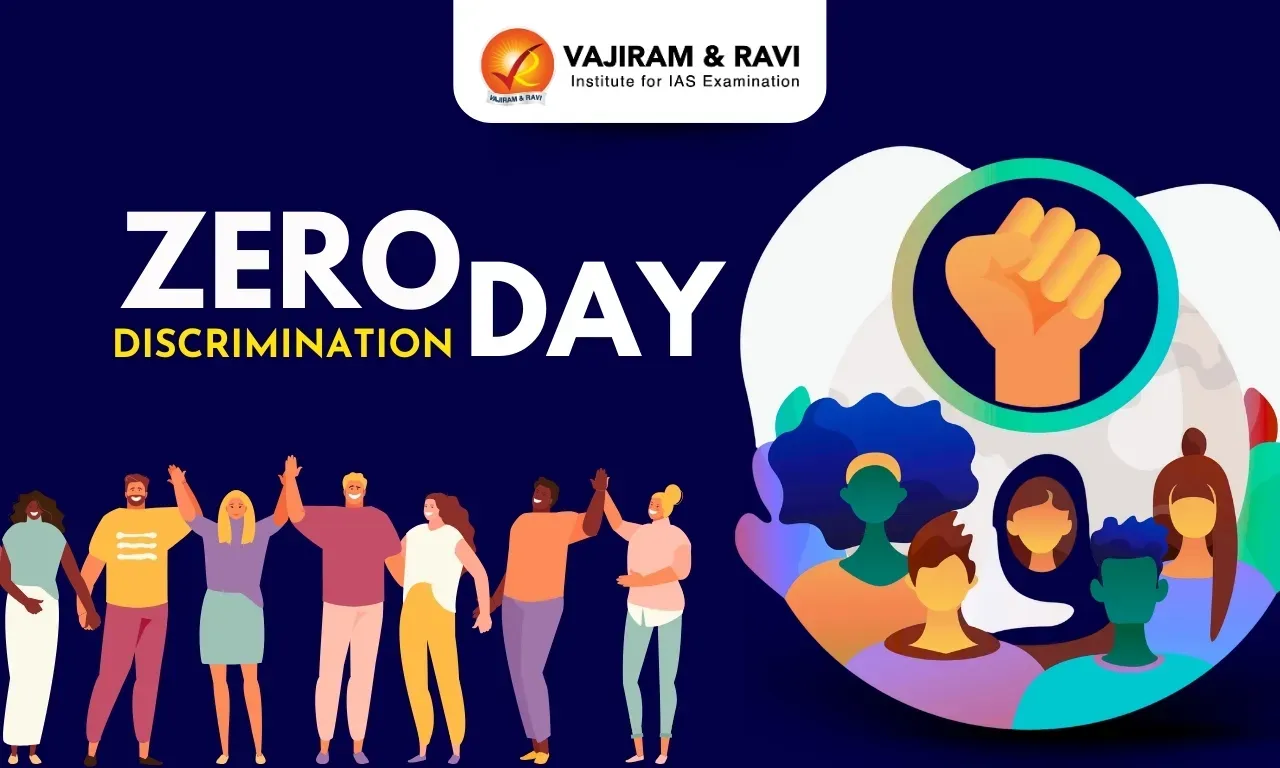Zero Discrimination Day observed on 1st March every year aims to promote equality and rights of individuals to live a dignified life without any discrimination. The day is led by UNAIDS, whose responsibility is to spread awareness about discriminatory practices based on sexual orientation, socioeconomic status, race and gender. Zero Discrimination Day 2025 reminds us that diversity is something to be acknowledged and practised and people should make conscious efforts towards eliminating prejudice, injustice and stigma. In this article, we are going to cover the importance, features and objectives of Zero Discrimination Day 2025.
Zero Discrimination Day 2025 Overview
Zero Discrimination Day 2025 is celebrated with the goal of highlighting the need of spreading awareness about discrimination and its impact on the lives of people. Led by UNAIDS and celebrated for the first time on 1st March 2014, the day highlights the importance of making policies that ensure fairness, respect and dignity, irrespective of their race, caste and background.
|
Zero Discrimination Day 2025 Overview |
|
|
Aspect |
Details |
|
Event Name |
Zero Discrimination Day 2025 |
|
Date |
March 1, 2025 |
|
First Observed |
2014 |
|
Organized By |
UNAIDS (Joint United Nations Programme on HIV/AIDS) |
|
Theme for 2025 |
“We Stand Together” |
|
Purpose |
Promote equality, eliminate discrimination, and support marginalized communities |
|
Key Focus Areas |
|
|
Significance |
Raises awareness about discrimination based on race, gender, disability, HIV status, and other factors |
|
How to Participate |
|
Zero Discrimination Day Objectives
Observed on 1st March every year, Zero Discrimination Day encourages everyone around the globe to take action against the discrimination practices happening worldwide. Several campaigns and events are organised in order to spread awareness about the day and plan the course of action for the same. The objectives of Zero Discrimination Day 2025 are:
- The day makes sure to remind everyone about the importance of equal access to opportunities and treating everyone equally and fairly.
- The goal is to eliminate any stigma related to HIV/AIDS, disability, gender identity etc.
- Emphasises on the need for inclusive policies and the consequences of discrimination.
- Pushing the countries that still have discrimination laws to get rid of them and save the vulnerable groups.
- Call for better and stronger support systems while highlighting the struggles of underprivileged groups.
Zero Discrimination Day 2025 Theme
The theme for Zero Discrimination Day 2025 is “We Stand Together” highlighting a particular aspect of discrimination. The day aims to promote the significance of collective action towards fighting discrimination. UNAIDS, takes up the responsibility of organising events and focuses on issues like social justice and sustainable health.
HIV/AIDS has been a significant discriminatory factor in society for over 40 years. Organisations have been taking up various initiatives and conducting seminars/ discussions to reach out to the marginalised populations, monitoring policies and spreading awareness about solving these existing problems.
Zero Discrimination Day 2025 Focus Areas
Zero Discrimination Day 2025 plays an important reminder for the ongoing fight against bias and inequality. Discrimination happens in many ways, affecting people’s rights, opportunities, and access to essential services. To address these problems, Zero Discrimination Day 2025 calls for action in several key areas:
- Ending HIV/AIDS Discrimination
Despite medical advancements, people living with HIV still face legal and social barriers that hinder their access to adequate care. The UNAIDS campaign emphasizes legal protection for people impacted by HIV, providing equality in healthcare opportunities with a focus on overcoming discrimination especially in the healthcare sector around the world.
- Promote Gender Equality
Gender discrimination is one of the most common discriminatory practices around the world and Zero Discrimination Day 2025 suggests to frame stronger legal frameworks, spread social awareness and awareness campaigns to overcome these problems.
- Tackling Workplace Discrimination
The Equal Employment Opportunity Commission 2024 report states that workplace discrimination has increased by 9% in 2024. Organisations need to implement stronger hiring policies and lay down strict guidelines towards anti-discrimination measures.
- Ensuring Equal Access to Education and Healthcare
The SDG goals focus on providing affordable and inclusive healthcare services to all and universal access to education and it makes it extremely important for all countries to address these problems like ethnicity, economic status, disability and work towards creating an equitable society.
- Strengthening Legal Protections Against Discrimination
Outdated laws led marginalised groups to face systematic discrimination and hence it became essential to adopt updated legal safeguard to end discrimination of all forms.
Challenges in Achieving Zero Discrimination
Discrimination happens to remain a significant persisting issue around the world and while some progress has been made, there is definitely more than that can be done. Challenges associated with zero discrimination are:
- Gender Discrimination
Despite progress, gender inequality remains a significant challenge all over the world:
- Only 10% of Head positions are held by women.
- Women have access to just two-thirds of the legal rights available to men.
- The global gender pay gap persists at 20%.
- One in three women experiences gender-based violence.
- Every 11 minutes, a woman or girl is killed by a family member.
Stronger legal protections, policy changes, and awareness campaigns are important to overcome these gender gaps and ensure equal rights for all.
- Workplace Discrimination
Employment bias continues to impact diversity and inclusion in the workplace. Companies must implement fair hiring practices, diversity training, and anti-discrimination policies to promote workplace equality.
- Health Disparities
Women’s healthcare continues to be restricted by legal and economic barriers:
- 800 women die daily from pregnancy-related complications.
- 270 million women worldwide lack access to modern contraception.
- 40% of women live in countries with restrictive abortion laws.
Universal access to reproductive healthcare and policy reforms are essential to improving women’s health outcomes.
- Discrimination in Education and Employment
Barriers to education and employment opportunities persist for marginalized groups:
- Women in many countries still face legal restrictions on education and career choices.
- People with disabilities struggle to find inclusive workplaces and accessibility accommodations.
- Racial and ethnic minorities experience wage disparities and limited career opportunities.
Governments and organizations must work towards inclusive policies, equal pay initiatives, and accessible education and employment for all.
Zero Discrimination Day 2025 is an opportunity to reaffirm our commitment to a fair and just society. Discrimination remains a significant challenge worldwide, but by working together under the theme “We Stand Together,” individuals, communities, and governments can take meaningful steps toward eliminating all forms of discrimination.
Last updated on December, 2025
→ Check out the latest UPSC Syllabus 2026 here.
→ Join Vajiram & Ravi’s Interview Guidance Programme for expert help to crack your final UPSC stage.
→ UPSC Mains Result 2025 is now out.
→ UPSC Notification 2026 is scheduled to be released on January 14, 2026.
→ UPSC Calendar 2026 is released on 15th May, 2025.
→ The UPSC Vacancy 2025 were released 1129, out of which 979 were for UPSC CSE and remaining 150 are for UPSC IFoS.
→ UPSC Prelims 2026 will be conducted on 24th May, 2026 & UPSC Mains 2026 will be conducted on 21st August 2026.
→ The UPSC Selection Process is of 3 stages-Prelims, Mains and Interview.
→ UPSC Result 2024 is released with latest UPSC Marksheet 2024. Check Now!
→ UPSC Prelims Result 2025 is out now for the CSE held on 25 May 2025.
→ UPSC Toppers List 2024 is released now. Shakti Dubey is UPSC AIR 1 2024 Topper.
→ UPSC Prelims Question Paper 2025 and Unofficial Prelims Answer Key 2025 are available now.
→ UPSC Mains Question Paper 2025 is out for Essay, GS 1, 2, 3 & GS 4.
→ UPSC Mains Indian Language Question Paper 2025 is now out.
→ UPSC Mains Optional Question Paper 2025 is now out.
→ Also check Best IAS Coaching in Delhi
Zero Discrimination Day 2025 FAQs
Q1. What is the theme of Zero Discrimination Day 2025?+
Q2. What is the butterfly in Zero Discrimination Day?+
Q3. Where is Zero Discrimination Day?+
Q4. Why do we celebrate Zero Discrimination Day?+
Q5. What is the symbol of Zero Discrimination Day?+
Tags: Zero Discrimination Day

















